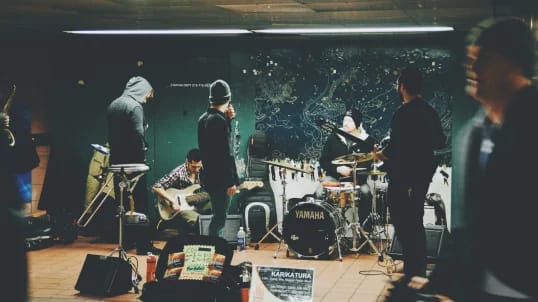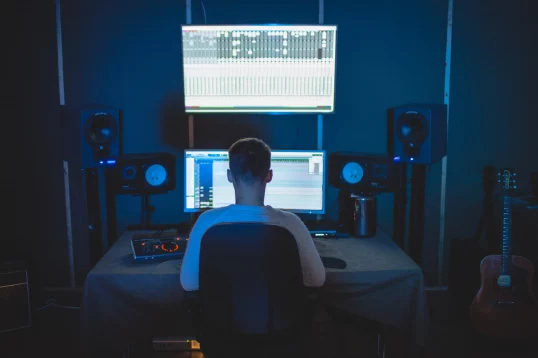It's possible to boost your music through partnership!
Partnerships are an excellent way of promoting your music. Whether you’re an independent musician or a novice band, partnerships are one of the best ways of rapidly growing your audience and your visibility.
What’s more, partnerships allow you to create synergies with other artists and other styles of music, enabling you to improve your music little by little.
In addition to these advantages, there are other benefits to establishing a partnership. But how do you establish a partnership? And above all, with whom? And for what purpose?
The Red Label Agency team can tell you more about the partnerships available to get your music noticed.

What's the point of a partnership when you're an independent musician?
As a singer, musician or independent artist, it’s often difficult to get your music known. This is a sector where competition is fierce, and where listeners’ attention is often focused on the same music.
But there are ways of making yourself heard and finding musical partners. Partnerships are a great way to promote your music and get your name out there.
- By teaming up with other musicians or independent labels, you can benefit from greater visibility and better distribution of your music.
- What’s more, the partnership enables you to make professional contacts and build up a solid network in the music world, which will always be of great benefit throughout your career.
- By establishing partnerships with other singers, groups or even cultural events, you can make yourself visible to an interesting (or not necessarily) audience that doesn’t yet know you. It’s a good way of gradually expanding your audience
- Partnerships can also make it easier for you to manage your music, register it on streaming platforms or in Deezer or Spotify playlists, market your latest sounds and allocate a substantial budget to promoting them.
The partnership is therefore an interesting solution for independent artists who want to make themselves known to the general public. By teaming up with various personalities or entities, you benefit from greater visibility and better distribution of your latest video, album or even your music as a whole.
The different types of partnership
At this stage, you need to understand that partnerships are a very powerful marketing tool for artists who want to promote their music.
There are different types of partnership, which can be more or less adapted to your situation and objectives. Here are the different types of partnership that exist.
With other artists, to raise your profile
The most obvious, but not always the simplest! The most obvious, but not always the simplest! By teaming up with other artists, you have the opportunity to reach an audience that doesn’t necessarily know you yet, or on the contrary to improve your visibility with an audience that knows you a little, but nothing more.
By teaming up with other artists, you have the opportunity to reach an audience that doesn’t necessarily know you yet, or on the contrary to improve your visibility with an audience that knows you a little, but not much more.
You can also approach a musician whose musical style does not, or hardly, correspond to yours: reaching a new audience is also a very good way of expanding your fanbase. You might be surprised to discover how many listeners enjoy your music even though they don’t usually listen to your style.

With record companies / labels, for your peace of mind
A music partnership with a label is an excellent way to benefit from the expertise and network of a music industry professional. A label can help you to produce and promote your music, and give you access to wider distribution channels. However, even though it used to be the holy grail for every musician to obtain a partnership with a label, this type of collaboration is no longer suitable for all artists, and it is important to choose the label you want to work with carefully.
However, if you want to be noticed by a label or record company, you need to have already reached a certain level. You need to have a few songs that have done well in order to have a chance of getting noticed.
In reality, with dozens, if not hundreds, of ongoing requests, it’s never the record companies that will come to you: if you’re really interested, the wisest thing to do is to contact the record company producers and present them with your work.
Pay attention to the various clauses in your contract:
- The label will demand exclusivity for your productions, so you won’t be able to sign other contracts elsewhere.
- The length of the contract: an advantage, but also a handicap depending on the situation. It’s up to you to decide whether you prefer a short (precarious) or long contract (which gives you peace of mind, but limits your opportunities).
- The budget invested in your productions (this is the point to negotiate!)
- Royalties (the percentage of each album sold, often around 13%, or net revenue sharing). To negotiate this point properly, it is advisable to call on other independent musicians and get outside advice.
In short, by becoming associated with a label, you benefit from better distribution of your music as well as professional support in promoting your work. Record companies and labels are a great boost to your musical career, but the obligations that come with your partnership can also severely limit your room for manoeuvre.
With festivals or events, to raise your profile

We often think of the partners and sponsors of a festival, but you are also, in a way, a partner when you appear as a speaker. The more visible you are by taking part in various music events, the bigger your audience will be. Remember: being visible in a world as competitive as yours is a significant advantage.
It’s the regularity and repetition of your public appearances and the publication of your new songs that will gradually take you up the ladder.
In the same vein, there are also partnerships with cultural organisations and local authorities. These types of partnerships enable you to benefit from financial or logistical support to promote and distribute your music, as well as being given the opportunity to take part in certain events.
With owners of playlists from a streaming platform, for better distribution
Partnering with a streaming platform such as Spotify or Deezer can be very interesting for artists who want to develop their audience. These platforms allow you to showcase your music to a wide audience, and also give you access to very useful analysis tools for tracking the engagement of your fans.
On these different listening platforms, playlists are certainly the best way of showcasing your music, even if the results are uncertain.
Put the odds in your favour: if you manage to establish a partnership with labels or independents who have reputable (and listened to) playlists, then you gain a huge competitive advantage.
With a brand, for your image
A partnership with a brand can be very interesting if you manage to find a brand that matches your image and your world. This type of partnership can give you a great deal of exposure, thanks in particular to the advertising campaigns that the brand can put in place. However, it is important to choose the brand you want to work with carefully, so that the partnership is relevant to your image and your career.
As with record companies and labels, contracts and their clauses need to be studied carefully.

How can you establish an effective partnership to raise your profile?
For the partnership to be a win-win situation, you need to study the proposal you receive first and foremost, or, on the contrary, construct the proposal you want to make as accurately as possible.
First of all, it’s important to target your potential partners. Some partnerships with artists or professionals can be complex if the objectives of one party conflict with those of the other. You should therefore take the time to get to know them well before embarking on a partnership.
Preferably choose partners whose audience is compatible with yours.
If you partner with an artist whose audience is totally different from yours, it won’t always be effective. As for the last point, you should take it into account when you start out, but as you develop featurings with different artists, it will be interesting to reach out to other audiences.
Once you’ve identified the right people to partner with, it’s important to know how to establish an effective collaboration. To do this, you need to be able to present your project clearly and concisely so that your partner understands what you expect of him or her.
Be transparent about what you want to achieve with this partnership, and what you expect from your partner. If you don’t communicate your expectations clearly, your collaboration is unlikely to be fruitful, or it could lead to conflict down the line.
Depending on your partner’s profile, you will focus on different things:
- for another artist, group or any party that doesn’t offer you a contract: what’s in it for you? constraints? Which audience is being targeted? What impact is expected? What is your long-term working relationship like?
- for a label, record company or any other party offering you a contract: what are your obligations? The benefits? What is the duration of the contract? What are the different clauses that can cause you problems? How do you negotiate?
Finally, it’s important to know how to manage your collaboration once it’s up and running.
To do this, it’s essential to have a good follow-up. Follow the impact and evolution of your collaboration on your musical career.
A partnership is an important relationship for your musical future: if you’re not available or if you don’t communicate sufficiently, your collaboration is unlikely to last.
As you can see, partnerships are an important tool that can help artists gain recognition and promote their music. This allows them to benefit from the visibility and reputation of their partner, while enabling them to develop their own network. Depending on the profile of your partner, you will have certain advantages, but also certain disadvantages, to negotiate to avoid embarking on a shaky collaboration.
FAQ - Music partnership
A music partnership is a contractual relationship between two or more parties, usually between an artist and a label, in which each party undertakes to make a contribution towards promoting and developing the artist’s music. Music partnerships can take a variety of forms, but they generally aim to give artists access to resources that would otherwise be inaccessible to them, and to give them greater visibility.
By providing financial, logistical or promotional support, music partners can help artists achieve their professional development goals. Music partnerships can also be used to strengthen links between the various players in the music world, and to encourage innovation and creativity.
They can be financial, logistical or promotional. Financial partnerships generally involve direct investment in an artist’s career by a label or private investor. Logistical partnerships involve providing artists with the equipment, materials or services they need to produce their music. Finally, promotional partnerships consist of any type of action aimed at making the artist and his music better known to the general public.
There are many ways to find a musical partner. The first is to approach labels or private investors who might be interested in your music. You can also get in touch with professional music organisations, which can put you in touch with potential partners. Collaborations and featurings with other artists are another way of establishing an interesting musical partnership.
There are no specific conditions required to sign a music partnership, but it is generally necessary for you to have a certain level of notoriety and for your music to be deemed sufficiently interesting by potential partners. Record companies get a lot of requests: you need to find a way to stand out, whether through your results or your music.
- Promoting your music for free
- Promoting your music on Facebook
- Showcase your musical performances with Facebook Live
- Promoting your music on Instagram
- Promoting your music on Spotify
- Promoting your music on Soundcloud
- Promoting your music on TikTok
- Promoting your music on Deezer
- Boosting your music with a partnership
- How can you create a buzz with your music?
- YouTube Ads guide
- Promoting your music on YouTube
